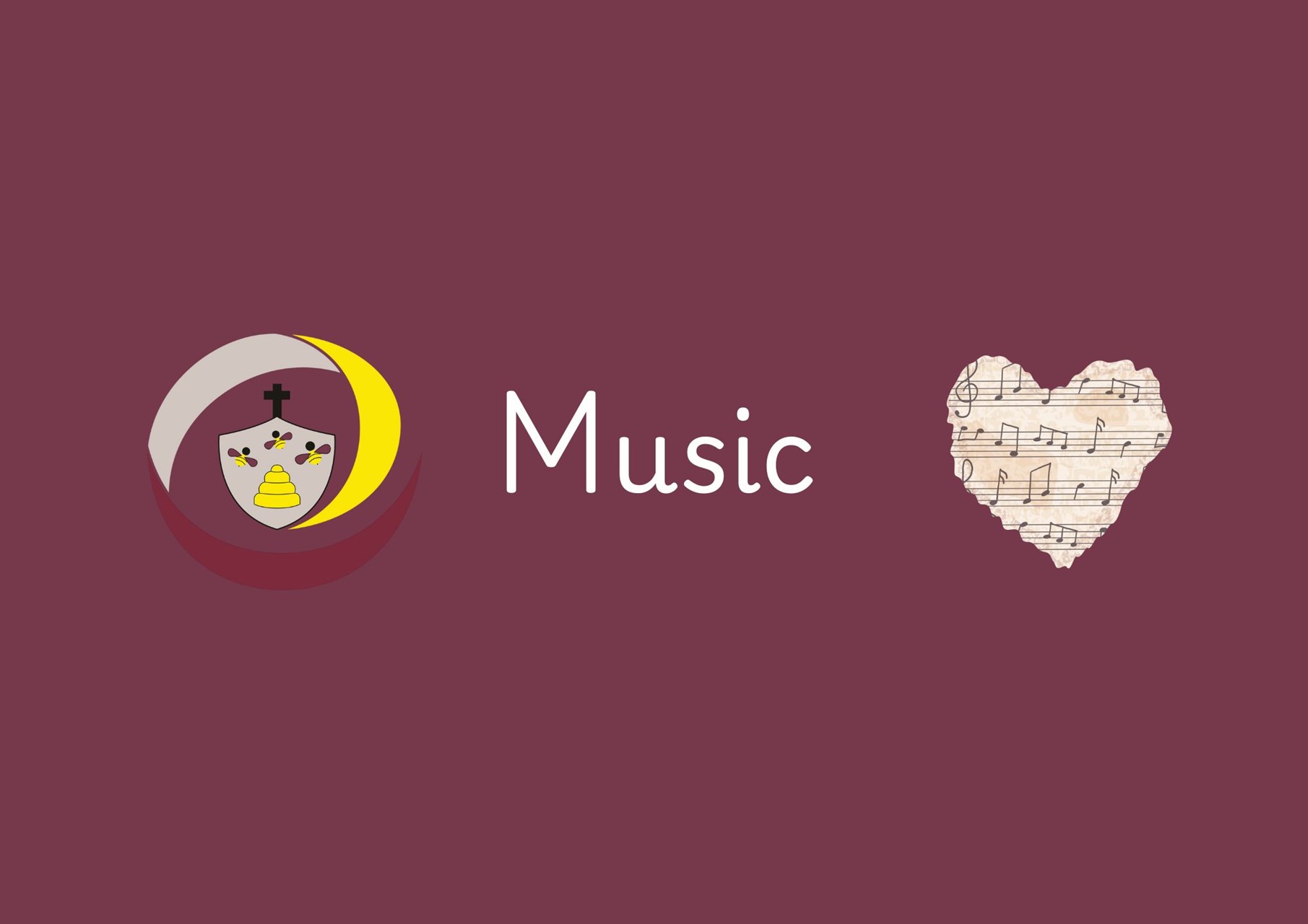
At St Ambrose, we aim to provide a music curriculum that is inclusive, inspiring, and challenging for all pupils. We believe music has the power to motivate, uplift, and nurture creativity, while playing an important role in each child’s personal development. Through music, our pupils develop a deeper appreciation of the world around them, gaining insight into a wide range of cultures and traditions.
Intent, Implementation and Impact
Intent
Our broad and balanced curriculum, in line with national expectations, enables pupils to:
Perform, listen to, review, and evaluate music from a range of historical periods, genres, styles, and traditions, including the works of great composers and musicians.
Sing and use their voices with confidence and expression.
Create and compose music independently and collaboratively.
Learn to play musical instruments and use technology to support and enhance their music-making, progressing towards musical excellence.
Understand and explore how music is created, produced, and communicated through key dimensions such as pitch, duration, dynamics, tempo, timbre, texture, structure, and notation.
Teachers use the National Curriculum as a foundation for planning, supported by music specialist, Mrs Mallinson to ensure structured progression and creative engagement. Lessons are carefully planned to build on three key areas of development:
Breadth and range of musical experiences.
Challenge and complexity within musical activities.
Confidence, sensitivity, and creativity in pupils’ music-making.
Music is taught both as a discrete subject and through cross-curricular links, including contributions to whole-school worship and celebrations.
In Key Stage 2, pupils further develop their instrumental skills:
In Year 4, pupils learn to play an instrument such as the flute, ukulele, violin, or clarinet, taught by a visiting professional music teacher
EYFS
In the Early Years Foundation Stage, music is taught through Expressive Arts and Design. Children enjoy singing songs, making music, and dancing, developing their awareness of pulse, rhythm, and pitch. Using the Charanga scheme, pupils listen and respond to different musical styles, sing nursery rhymes and action songs, and perform for others. They are encouraged to experiment with sound using everyday objects and our outdoor music wall, exploring how materials such as wood, metal, and plastic create different tones and effects.
Music at St Ambrose enables children to develop a strong understanding of culture, history, and diversity, both within their own experiences and across the wider world. Pupils are encouraged to enjoy music as listeners, creators, and performers, sharing their ideas and respecting the perspectives of others.
Through their musical journey, pupils learn to analyse and discuss music with confidence, recognise its elements, and express themselves through song and performance.
We also provide opportunities beyond the National Curriculum to enrich our pupils’ musical experiences; including visits from musicians, school performances, concerts, and opportunities to share personal talents in assemblies. Every child is encouraged and challenged, regardless of prior musical experience, and inspired to continue developing their skills and love of music throughout life.
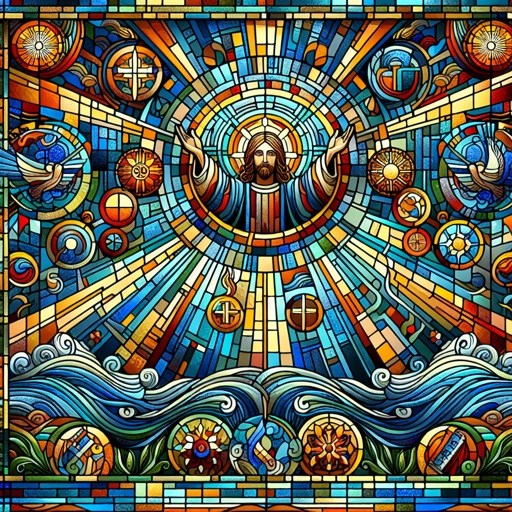
Curriculum
Catholic Social Teaching
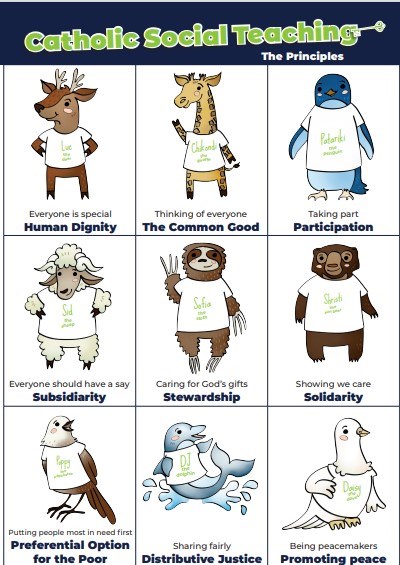
In KS1 and KS2, linking CST to Music encourages pupils to value every person’s contribution, celebrate cultural diversity, and consider how music can inspire positive change. Whether learning traditional songs, studying composers, or creating their own pieces, children can explore themes of care for creation, inclusion, and respect for others, deepening both their musical and moral understanding.
Human Dignity
Solidarity
The Common Good
Option for the Poor and Vulnerable
Care for Creation
Catholic School Pupil Profile
Music helps pupils grow as grateful and generous individuals by encouraging them to appreciate the gift of music and share their talents with others in performances and worship. Through collaborative music-making, children become attentive and discerning, listening carefully to sounds, rhythms, and harmonies, and making thoughtful choices when composing or performing. These experiences nurture eloquence, as pupils learn to express emotions and ideas through music, and intentionality, as they practice and perform with purpose.
Exploring music from different cultures and historical periods fosters curiosity and wisdom, helping pupils understand the richness of human creativity. Singing hymns and liturgical music supports being faith-filled and hopeful, while composing and interpreting music encourages learned and active engagement. Music also promotes compassion and love, as pupils connect emotionally with others through shared musical experiences, and truthfulness, as they express authentic feelings and respect the integrity of musical traditions.
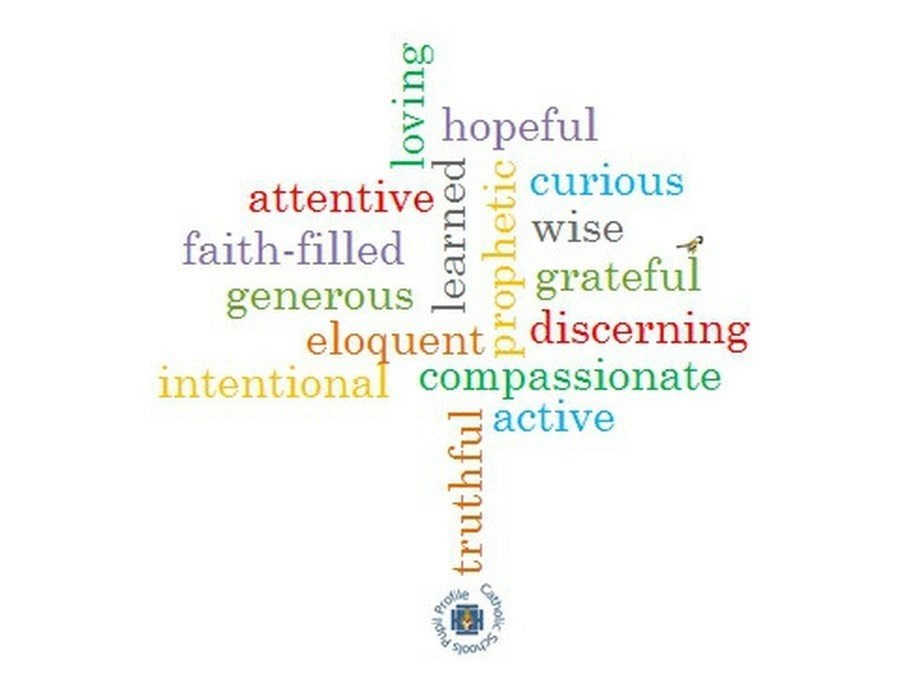
What our children say about Music
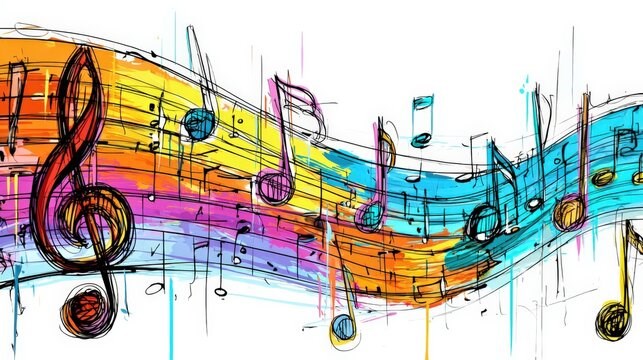
Reception (EYFS)
“I love singing and dancing with my friends. We make music together!”
“I can play the instruments quietly and loudly! I like hearing the different sounds.”
“When I hear music, it makes me want to move and smile.”
Year 1
"I can clap the beat and keep in time with the song.”
“My favourite thing is using the drums when we sing.”
“I like when we listen to music and talk about how it makes us feel.”
Year 2
“We learned that music can tell a story without any words.”
“We listened to music from other countries, it sounded really different!”
“I can hear when music goes high or low, and when it gets louder.”
Year 3
“Mrs Mallinson teaches us new songs and helps us understand how music works, we’ve learned so much already!”
“We’ve been learning how to read and follow simple notes when we play together.”
“It’s fun when Mrs Mallinson plays an instrument for us it makes me want to learn more about music.”
Year 4
“Mrs Mallinson helps us understand how music fits together we’ve learned about rhythm, pitch and how to perform as a group.”
“We have ukulele lessons on Fridays and it’s fun learning real chords and playing songs together.”
“It’s exciting when we all play different parts at the same time and it sounds like a real band!”
Year 5
“Mrs Mallinson teaches us about different styles of music, I like learning how instruments from around the world sound.”
“I like how Mrs Mallinson explains how music links to feelings and tells a story.”
“We’ve been learning to play and perform in small groups, it’s great hearing how our parts fit together.”
Year 6
“Music lessons with Mrs Mallinson make me feel confident to perform and lead others.”
“We’ve learned how music has changed over time and how it can bring people together.”
“Music helps me relax and express myself. It’s one of my favourite lessons of the week.”